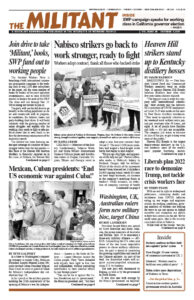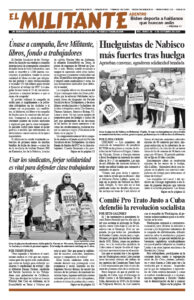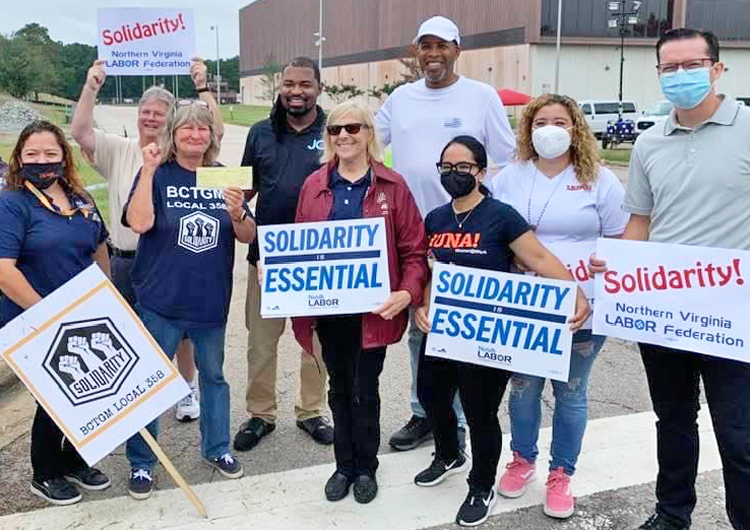CHICAGO — Members of the Bakery, Confectionery, Tobacco Workers and Grain Millers International Union at Nabisco plants and distribution centers in Oregon, Colorado, Virginia, Illinois and Georgia voted to adopt a new four-year contract Sept. 16 and 17. The over 1,000 union members had waged a hard-fought strike battle that began in mid-August.
“We put up a big fight, and appreciate all the help we got,” Portia LeBleu, who works at Nabisco’s bakery in Portland, Oregon, told the Militant. While all the details of the agreement haven’t been released yet, it includes a $5,000 signing bonus, yearly 60 cents an hour wage increases, an increase in the company’s matching funds in worker’s 401(k) accounts, no reduction of company coverage of health insurance, and creation of a new, 36-hour weekend shift at 40 hours pay. Probation is set at 60 calendar days.
Exactly how some of the strike issues work out, LeBleu said, “depends on what we do with our co-workers on the floor to set the pace of work and the way it’s going to be. The fight continues to be worked out on the job.”
After Bakery Workers union Local 1 members here in Chicago voted on the proposed agreement, workers returned to the picket lines, which stayed up until the results of the overall vote were counted at the union headquarters in Washington, D.C. Honking and whistling sometimes drowns out the conversation. Signs say, “No contract, no cookies!” “The real cookie monster is here!” and “On strike for the union and our families!”
“The company called the union with an offer, not the other way around,” said Daniel Karpowicz, chief union steward. “They are hurting. They want us back.” Nabisco is owned by international snack behemoth Mondelez.
“We’ll go back stronger,” said James Walsh, a 41-year veteran utility worker. “We banded together better out here on the picket line than we ever did in the factory, where it’s hard to have discussions. I’ve gotten to know my co-workers and fellow fighters. And we have more confidence. The company thought we were going to roll over. They thought we were pussycats. But now we’re lions.”
The contract says the company can set up a weekend crew that works 12-hour shifts on Friday, Saturday and Sunday, he said. “They will work 36 hours and get paid for 40. At least half of them will be new hires, but current workers can bid onto the crew. But once you get onto the weekend shift, you have to stay there for a year.” He added that this should substantially reduce mandatory overtime on the weekends, which was a big issue in the strike.
There also are issues with the two different shifts, he said. “It can divide us, and that’s not good. We’ll have to fight against this next time.”
Ofelia Ballinger, who works on the main table in packing, said, “The union is stronger because of the strike. In 2016 we lost the pension. They moved production of Oreos, Ritz, Chip Ahoy, and Fig Newtons to Mexico. Six hundred of us were laid off. They laid off the quality control workers, and then they said that we had to do the quality control checks ourselves at the same time we worked on the production line. They make us do more work with less people.”
Mirjana Loncar is a relief worker on line 9. She said that when she was hired in 1984, there were 4,000 workers in the plant. “We hand-packed everything. One by one the lines were automated, and the majority lost their jobs. And then we had to keep up with the line speed.” Now there are 350-400 working in the factory.
“The company always tries to make it harder for us to work,” she said. “Before the strike, they took our chairs away so we had to stand on the line. If the chairs aren’t there when we go back, we’ll just put them back.”
Solidarity needed here, worldwide
Strikers got a lot of solidarity from other unions and working people. There was a lot of discussion on the picket line about other strikes going on. “A lot of eyes have been on us to see what we could do,” said Walsh. “We should do something to support the auto mechanics,” who went out on strike in the Chicago area Aug. 2. Loncar agreed, saying, “I went past one of their picket lines yesterday. I told them, we are on strike too! Be strong! Stand up for your rights!”
A discussion broke out about U.S. bosses that move their plants to Mexico. Ballinger asked, “Why does the U.S. government let companies move to Mexico? That makes unemployment worse here.” This worker-correspondent replied the U.S. is a capitalist country, and the government supports everything that big business needs to make more profits. Workers in Mexico are more exploited than workers here, they get much lower wages for doing the same production that used to be done here.
“That’s true,” said Ballinger, who is originally from Mexico, like a sizable number of workers at the plant and in the neighborhood. “We need to fight together for the unions. They try to divide us. Unity is the only way we can all win.”
Loncar, who is Croatian, said she recently went home to visit relatives. “The prices in the stores are much higher than they are here,” she said. “And wages are very low. They need to fight for better wages and working conditions like us.”
“We’re going back much stronger,” said Karpowicz. “There’s a lot of solidarity between us. When we have a grievance, we’ll put up a fight. My message to other workers is, ‘Don’t be afraid. If it comes to a strike, then strike!’ We don’t have to take blows on our chins.”
After the contract was approved, the company said workers will be recalled starting this week. “What about the maintenance workers?” one worker asked. The electricians, equipment mechanics and other maintenance workers who are members of other unions honored the Bakery Workers strike, and many joined the picket lines.
“We need to be ready to be out here helping them next spring when their contracts expire!” said Karpowicz.


